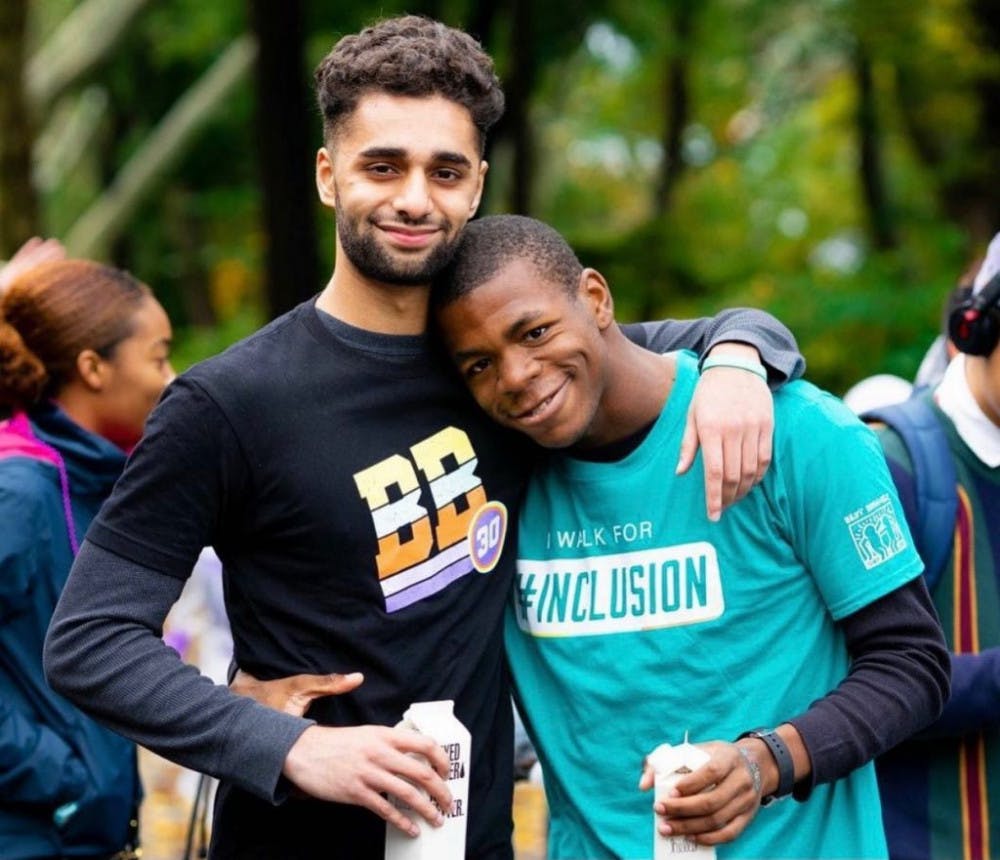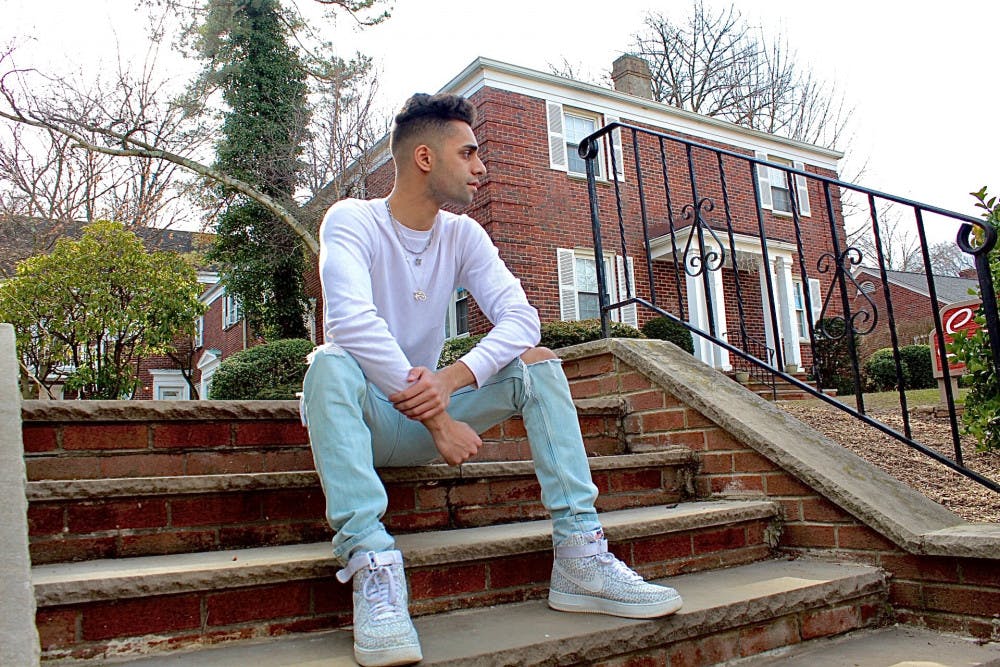Daniel Baluch’s story
Some see this Seton Hall student as a business student or a fraternity member. Others see him as a tour guide. Then there’s some who know him as an artist. And perhaps a social advocate, too.
But everyone knows him as Daniel Baluch, a junior marketing major.
Behind his college identity, Baluch grew up as a young Pakistani kid paralyzed with fear due to microaggressions against his ethnicity. Instead of allowing the trauma to silence his voice, he decided to channel his frustrations through various avenues.
As a marginalized student at a predominately white institution, Baluch found organizations and activities that provided spaces for him to work with students with shared experiences to create change.
The Voyage Begins
Seton Hall was always on Baluch’s radar after following the men’s basketball team for several years. After conducting further research into the school, Baluch said he stumbled upon the Martin Luther King Scholarship Association (MLKSA) and fell in love with the program.
“After I had an interview with Dr. Pritchett, and he talked to my mom, I knew right off the bat I just wanted to go to Seton Hall and be an MLKSA scholar,” Baluch said, referencing the director of the program Rev. Dr. Forrest Pritchett.

The MLKSA program, established in 1970, focuses on management and leadership development skills and programs dedicated to social justice, according to the Seton Hall website. Baluch said MLKSA provides that familial bond and surrounds him with like-minded individuals.
“The organization stands for everything that I stand for and will stand for everything I speak out for,” Baluch said.
When he was 14, Baluch found a new passion for social activism as a result of a spiritual journey. He said he began to realize that he finds it necessary to provide a voice for those who do not get to have their story told.
The nation witnessed historic nationwide protests against police brutality over the summer. Baluch said he attended several protests to advocate for the movement and fight for all Black lives, including transgender and queer lives. He added that he has a great passion for advocating for women’s rights, the #MeToo movement and human trafficking issues.
While the program provides a platform for Baluch to speak out on these social issues, MLKSA also offers an opportunity for him to mentor incoming scholars. Baluch serves as a mentor to Donnie Oliver, a sophomore business management major.
“Our connection is deep,” Baluch said. “That is my brother. I am glad to be his mentor… Whenever he asks me for guidance or something, I am more than happy to step in and be that figure for him.”
Oliver said Baluch serves as a great role model for him on many levels. He was drawn to Baluch as he saw someone who is passionate, determined and selfless. Oliver also praised his leadership skills, fearlessness, humor and positivity.
“I think we get along so well because we are able to learn and grow from each other,” Oliver said. “I could call him at any time and ask him a question about anything, and he would give me his honest feedback and vice versa.
“He is also very supportive of me dealing with the passing of my mother,” he added. “Daniel has impacted my life by just being a good friend. Nowadays, a lot of people are not solid or genuine, and he was both of [those] things, and I could not ask for anything more.”
A New Found Family
Last fall, Baluch joined a new family and became a brother of the New Jersey Gamma chapter of Phi Delta Theta.
“When I came to Seton Hall, I was not going to rush into any fraternity,” Baluch said. “Somehow, someway, I ended up making friends in Phi Delt. I was genuinely getting to connect with them. I would talk a lot about MLKSA with them, and they were so intrigued that I was a freshman and doing so much on campus.”
Having many of these conversations led Baluch to rethink his decision about joining Greek life, though he noted he had some hesitations about joining a predominantly white fraternity. After joining the fraternity, he felt that his background was not tokenized.
Baluch noted similarities between the fraternity and MLKSA. He said that like MLKSA, he felt that he had a brotherhood in Phi Delt that would support him with any of his passions.

“I never anticipated that if I was to join a fraternity, that I would be supported whether it’s with astrology, music or human rights,” Baluch said. “I can still fully be myself, and everyone is supportive of it.”
The fraternity has allowed Baluch to connect and bring specific issues to the forefront of Greek life. He hosted a conversation over the summer with Brandon Harley, a junior visual and sound media major and brother of Phi Delta Theta, to discuss race in Greek life.
Now serving as the President of the Interfraternity Council (IFC), Baluch said he hopes to further his connection with the predominantly white community. His plan is to bridge the gap between the several different councils, including the cultural fraternities and sororities.
Establishing a Legacy
Late in his sophomore year, Baluch accomplished another milestone. He contributed to the chartering of a chapter of Best Buddies on campus with a team of students. The nonprofit organization focuses on volunteering and creating opportunities for people with intellectual and developmental disabilities.
Baluch has been involved with Best Buddies since high school. He said he was influenced to join this organization after growing up with someone who has a disability. Through his work with this organization, Baluch has been granted opportunities to speak at their Leadership conferences, attend walks and work on nationwide initiatives with the Youth Leadership Council.
“I got to help out with initiatives with other chapters and other states,” Baluch said. “I have worked on some initiatives for people in Massachusetts and Florida. [The organization] helps them find housing…help them find employment and also help with the social isolation they face.”
Baluch said by creating a chapter at Seton Hall, it provides a space to help provide programs that allow people to experience regular interactions.
Alex Abrams, a junior psychology major, worked closely with Baluch to charter the chapter on campus.
Similar to Baluch, Abrams started her involvement with Best Buddies in high school. She said she had a close connection with the organization as her sister has special needs and was a part of the program.
Abrams said she overheard that Baluch wanted to start a chapter, and she knew she wanted to be a part of the process.
“Working with Daniel has been great,” Abrams said. “He brings a lot of energy to the organization and is able to use his involvement in other organizations to help encourage participation in Best Buddies.
“He’s really passionate,” she added. “His energy helps to keep the org moving forward.”
‘Right Timing’ for Music
Outside of Seton Hall, some might know Baluch through his music career. Baluch began rapping at 14-years-old and began recording music the following year. His music career started to take off four years later, he said.
Baluch said he found the motivation to pursue a music career after Best Buddies provided him an opportunity to perform at its closing ceremony for the 2018 Leadership Conference.
He said after receiving praise for his performance, he began to realize that this is something he might be interested in doing and seeing what else he can do.
Through networking, he has been able to work with local producers in Irvington—and Brandon Korn, who works as a producer for Sony/ATV Music Publishing company. Korn helped Baluch produce his single, “Dear Future Me.”
“I have five or six songs up my sleeve that I am looking forward to dropping,” Baluch said. “It is definitely a lot to do all this independently, while school is on your plate, so one thing I try to remind myself… is just to have fun with it.”
Later in his music career, Baluch established his stage name as “Right Timing.” Baluch discussed his reasoning behind the meaning of this stage name.
“’Right Timing’ is how I perceive certain aspects of me and how I express it,” he said. “It is more than Daniel Baluch rapping.”
‘Fullest Version of Me’
“I feel that everything I do is always connected to each other,” Baluch said. “I do not live segmented portions of my life. Somehow for me, I connect MLKSA, Phi Delt, music and IFC and my past and future. I do not live my life separately.
“I am always the fullest version of me,” he added. “Being tapped into different communities, I wanted to further establish a sense of community at Seton Hall.”
Baluch said he tries to incorporate the social justice issues learned in MLKSA into the Greek life community. Being tied into these different communities, Baluch has contributed to creating a foundation to bridge these gaps of separation at the University.
“Whatever I am a part of, whether it is MLKSA, Phi Delt or the other organizations I am involved in, you are going to get the same me,” Baluch said. “I’m fully open, and allow myself to be vulnerable… which helps me belong in these communities and therefore allows me to see where work needs to be done and cross-reference from other organizations as a student leader.”
Nicholas Hernandez can be reached at nicholas.hernandez@student.shu.edu.





